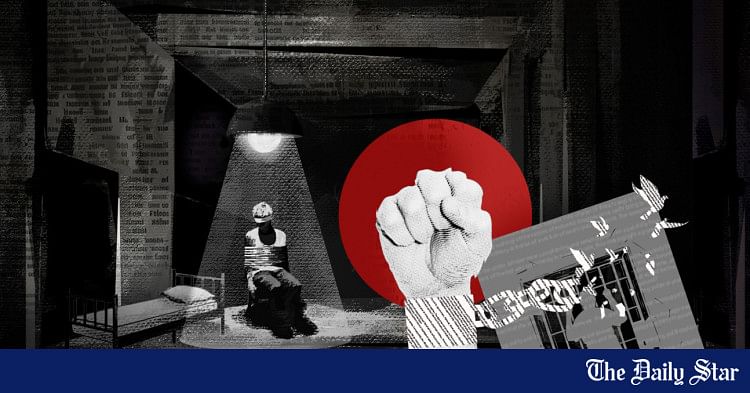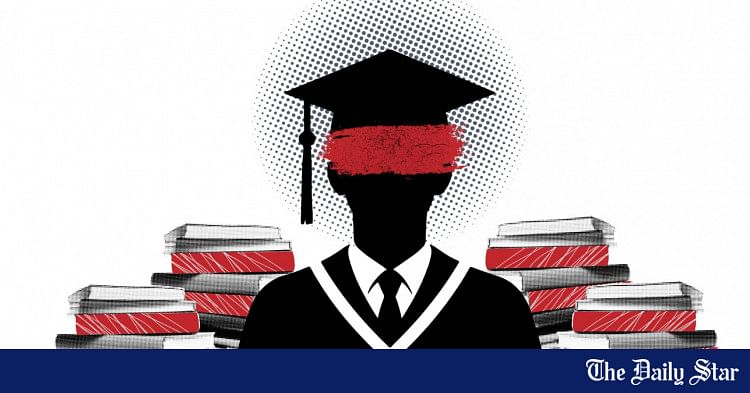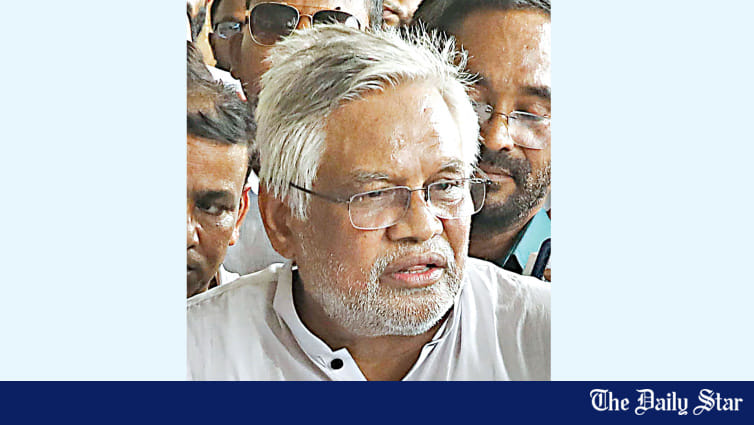Saif
Senior Member
- Joined
- Jan 24, 2024
- Messages
- 17,364
- Likes
- 8,373
- Nation

- Residence

- Axis Group


Aynaghar sample of ousted AL govt’s brutality: Yunus
Describing the Aynaghar, secret torture cells, as horrific, chief adviser professor Muhammad Yunus on Wednesday said that the deposed Awami League government had established the age of brutality in all sectors and the Aynaghar was the sample of it...
 www.newagebd.net
www.newagebd.net
Aynaghar sample of ousted AL govt’s brutality: Yunus
Bangladesh Sangbad Sangstha . Dhaka 12 February, 2025, 21:44

Chief adviser Professor Muhammad Yunus, along with advisers Asif Mahmud, Mahfuj Alam, Asif Nazrul and others, inspects an electric chair in a torture cell named Aynaghar, which had been previously used as secret detention centres, in Dhaka’s Agargaon area on Wednesday. | Star Mail photo
Describing the Aynaghar, secret torture cells, as horrific, chief adviser professor Muhammad Yunus on Wednesday said that the deposed Awami League government had established the age of brutality in all sectors and the Aynaghar was the sample of it.
‘Aynaghar is the sample of how the previous government established Al-Jahiliyyah [the Age of Ignorance] in all sectors,’ he told after visiting three spots of Aynaghar, the notorious secret prison during the era of fallen Sheikh Hasina’s government, in Dhaka.
Briefing media at foreign service academy in Dhaka, chief adviser’s press secretary Shafiqul Alam said that professor Yunus mentioned that what he witnessed during his visit to Aynaghar was ‘beggar description’, terming it as a ‘horrible scene’ which was far away from humanity.
‘How many victims described their ordeal to me seemed unbelievable...how many [victims of enforced disappearance] and how much I listened seemed unbelievable,’ Alam said, quoting the chief adviser as saying.
Yunus said that despite having no fault, the victims of enforced disappearance were tortured by confining them in Aynaghar. ‘Is it our society? Had we built this society?’ he questioned.
The victims, he said that were put in such chambers which were smaller than chicken hoops and they were confined and tortured there for consecutive months. The victims were deprived of their minimum rights, he added.
‘This was an offense of all of us. We allowed it to happen,’ the chief adviser said, adding that if the society could not be brought out of the absolute form of repression, it would not sustain.
Expressing his gratitude to the commission of inquiry on enforced disappearances for publishing its report, he said that it was an important document for the nation and called for inclusion the issue in textbooks.
Yunus reiterated that all those involved in the incidents of enforced disappearance would be brought to justice.
Advisers Asif Nazrul, Syeda Rizwana Hasan, Adilur Rahman Khan, Asif Mahmud, Mahfuj Alam and Nahid Islam, among others, were present.
Members of the commission of inquiry on enforced disappearances, victims, local and international media accompanied the chief adviser during the visit in the spots in Dhaka’s Agargaon, Kachukhet and Uttara areas.
Speaking at the media briefing, Shafiqul Alam said that professor Yunus visited every secret torture cell of Aynaghar, while victims of enforced disappearance described the ordeal they faced during their detention there.
He said that there were 700 to 800 Aynaghars across the country and all those would be unearthed.
Chief adviser’s deputy press secretaries Apurba Jahangir and Abul Kalam Azad Majumder, senior assistant press secretary Foyez Ahammad and assistant press secretary Suchismita Tithi were present at the briefing.
Bangladesh Sangbad Sangstha . Dhaka 12 February, 2025, 21:44
Chief adviser Professor Muhammad Yunus, along with advisers Asif Mahmud, Mahfuj Alam, Asif Nazrul and others, inspects an electric chair in a torture cell named Aynaghar, which had been previously used as secret detention centres, in Dhaka’s Agargaon area on Wednesday. | Star Mail photo
Describing the Aynaghar, secret torture cells, as horrific, chief adviser professor Muhammad Yunus on Wednesday said that the deposed Awami League government had established the age of brutality in all sectors and the Aynaghar was the sample of it.
‘Aynaghar is the sample of how the previous government established Al-Jahiliyyah [the Age of Ignorance] in all sectors,’ he told after visiting three spots of Aynaghar, the notorious secret prison during the era of fallen Sheikh Hasina’s government, in Dhaka.
Briefing media at foreign service academy in Dhaka, chief adviser’s press secretary Shafiqul Alam said that professor Yunus mentioned that what he witnessed during his visit to Aynaghar was ‘beggar description’, terming it as a ‘horrible scene’ which was far away from humanity.
‘How many victims described their ordeal to me seemed unbelievable...how many [victims of enforced disappearance] and how much I listened seemed unbelievable,’ Alam said, quoting the chief adviser as saying.
Yunus said that despite having no fault, the victims of enforced disappearance were tortured by confining them in Aynaghar. ‘Is it our society? Had we built this society?’ he questioned.
The victims, he said that were put in such chambers which were smaller than chicken hoops and they were confined and tortured there for consecutive months. The victims were deprived of their minimum rights, he added.
‘This was an offense of all of us. We allowed it to happen,’ the chief adviser said, adding that if the society could not be brought out of the absolute form of repression, it would not sustain.
Expressing his gratitude to the commission of inquiry on enforced disappearances for publishing its report, he said that it was an important document for the nation and called for inclusion the issue in textbooks.
Yunus reiterated that all those involved in the incidents of enforced disappearance would be brought to justice.
Advisers Asif Nazrul, Syeda Rizwana Hasan, Adilur Rahman Khan, Asif Mahmud, Mahfuj Alam and Nahid Islam, among others, were present.
Members of the commission of inquiry on enforced disappearances, victims, local and international media accompanied the chief adviser during the visit in the spots in Dhaka’s Agargaon, Kachukhet and Uttara areas.
Speaking at the media briefing, Shafiqul Alam said that professor Yunus visited every secret torture cell of Aynaghar, while victims of enforced disappearance described the ordeal they faced during their detention there.
He said that there were 700 to 800 Aynaghars across the country and all those would be unearthed.
Chief adviser’s deputy press secretaries Apurba Jahangir and Abul Kalam Azad Majumder, senior assistant press secretary Foyez Ahammad and assistant press secretary Suchismita Tithi were present at the briefing.








































